One of the most popular blogs on this site is
“What Your Computer Could Be Doing to Your Face.”
Unfortunately, the disturbing news doesn’t stop there.
That one-eyed monster staring back at you every day could also be harming your teeth.
Vicious little beast, isn’t it?
Computer Cavities: It’s Not Me, It’s You
Of course, it isn’t really the computer messing with your choppers, but what you do while you’re at the computer that can have serious ramifications in your mouth.
Our oral health is usually the last thing we’re thinking about when we’re typing away, but that’s just the problem—we’re not thinking about it, and we should be.
That’s what this post is for. To let you know what’s going on, so you can make a few minor changes that will protect your teeth from computer cavities and other issues.
Check out the following list and admit it—you do at least one of these things!
5 Ways You’re Destroying Your Teeth While Working on the Computer
Hours typing away without thought of anything but what’s in your head and what’s showing up on your screen—the dental ramifications can be catastrophic.
Here’s what happens:
1. You sip on sugary, carbonated drinks.
You already know these are bad for your teeth. The potential damage gets much worse when you’re working at the computer, because the tendency is to sip on the stuff all day long, or at least for a good amount of time.
By doing so, you’re essentially bathing your teeth in sugar and acid—both of which are horrendous for your smile. Bacteria in your mouth thrives on sugar, so you’re essentially feeding all the bugs that will later cause inflammation, gum disease, and cavities if you’re not careful.
And the acid—here’s a scare for you. A 2013 study found that drinking large quantities of your favorite soda could be as damaging to your teeth as methamphetamine and crack cocaine use!
The sodas, according to researchers, caused a similar wearing away of the protective enamel, leaving teeth more susceptible to developing cavities and to becoming cracked, sensitive, and discolored.
“The citric acid in both regular and diet soda is known to have a high potential for causing tooth erosion,” said lead author Mohamed A. Bassiouny, DMD.
Tips to reduce the damage: Drinking water is your healthiest option, but I know how it is when you’re working long hours and you need some sugar, or just something to do with your mouth because the project is so boring!
Low-sugar options like iced tea (sweetened yourself) or infused water (add sliced citrus fruits, crushed fresh mint, crushed berries, or peeled and sliced fresh ginger or cucumber) are better for your teeth. If you go for carbonated, you’re attacking your teeth with acid. Studies have found root beer to be the least damaging of all colas and non-cola “clear” sodas.
Use a straw—it will limit the amount of liquid that gets onto your teeth. And you don’t have to gulp it down, but do try to finish your drink in a shorter amount of time and then rinse your mouth with water.
Whatever you do, don’t brush after drinking something carbonated!
The acid weakens the enamel, and if you brush right away you’ll only weaken it more. Give your teeth at least an hour to recover before brushing. Stick to rinsing only, with water or with mouthwash for additional protection.
2. You sip on coffee or tea.
These are both better options than sodas and other sugar-sweetened beverages because they have less sugar (as long as you’re not adding too much after the fact), and they aren’t as acidic (though they can still erode enamel). Both of these drinks, however, will stain your teeth.
Yes, you can always whiten, but that can cause sensitivity.
Tips: I’m definitely not suggesting you stop drinking coffee and tea. These are both very healthy beverages that contain a lot of good-for-you antioxidants. Plus the natural polyphenols may also help reduce gum inflammation that can lead to gingivitis.
Instead, try to minimize the staining by rinsing with water after you finish your hot cup of whatever. Black tea does stain more than coffee, just so you know. Green and white teas will also cause less discoloration.
You’d think herbal teas would be even less problematic, and they are when it comes to staining teeth, but one study found that herbal tea corroded enamel five times more than black tea, so keep that in mind. (This was a single study—we need more to be sure of the effect herbal tea has on enamel.)
You can use a straw to drink the beverage if you don’t mind it lukewarm. Adding milk or cream will lessen the staining effect. There is also some evidence that brewing your coffee or tea with “hard” water (which has more mineral content) will reduce the staining impact.
3. You munch and suck on sugary stuff.
You know how it is. You’re facing a deadline and you have to work, but you’re really tired of sitting at the computer, so you reach for something to munch on. If it has sugar in it, it’s likely to be bad for your teeth. Cookies, granola bars, candy, gummy bears, and other similar sticky, gooey, chewy things can coat your teeth in food for bacteria. Do this most every workday and you can ruin your oral health in a hurry.
Tips: First, choose healthier snacks to munch on. I’ve listed ten healthy munchies for you here. Above all, try to avoid sticky snacks like gummy bears and fruit roll-ups.
Next, try pairing your snacks with enamel-protecting foods like milk, yogurt, and cheeses, as these foods have calcium and vitamin D that help protect teeth.
Finish your snack with something that helps clean teeth. Carrots, celery, and other crisp fruits and raw veggies do the trick. (You can also just snack on these for healthier teeth.)
Finally, chew some sugar-free gum (preferably with protective xylitol) after finishing your snack to clean your teeth, stimulate the production of saliva (which is also protective), and reduce bacteria. Rinsing with water or mouthwash afterwards also helps.
It’s best to wait for at least an hour to brush if you consumed anything acidic, including citrus fruits, vinegar, pickles, dried fruit, and sugary foods.
4. You gnaw on pens, pencils, and other hard objects, or grind your teeth.
You’re thinking, thinking, thinking…and just can’t find a solution to the problem facing you on the page. Tap tap tap, the pen on your desk goes into your mouth. Or that ice cube from your soft drink. Or the end of your fork or spoon.
If all your pencils and pens have teeth marks, you’re regularly chewing all the ice in the bottom of your glass, or you have a habit of gnawing on other similar items, you could end up harming your teeth. These things are very hard, and can overload the ability of the teeth to withstand the force of chewing on them.
The damage can occur without you even noticing. Small microfractures may develop over time, and continue to progress until you chip off part of the enamel, crack a filling, or actually break the tooth. If the damage is severe enough, you could require a root canal, or have to go through other major treatments.
Nail biting and teeth grinding (you may not know you’re doing it if you’re stressed) can also cause damage to teeth. Grinding can lead to chipping, cracking, fracturing, and tooth loss, in addition to potentially causing headaches, and stressing the jaw joint. If you’re biting your nails you’re also risking chips and cracks as well as introducing bacteria into your mouth that can cause inflammation.
Tips: First of all, work stress relief into your day. Get up every 30 minutes to walk around and stretch. Have some calming music nearby. Make sure you stick to a regular exercise routine.
If you find yourself still chewing (or grinding) away, keep some other items at your desk to distract yourself. Sugar-free chewing gum, squeeze balls, aromatherapy diffusers, homemade flavored popsicles (watch the sugar content), and even small weights can do the trick. If you can’t break away from chewing your pencil or pen, try these clear chewy pencil toppers or chew stixx toppers that are easier on teeth.
5. You breathe through your mouth.
This can be particularly prevalent during allergy season, or when you’re suffering from a cold. You turn into a mouth breather. When you’re working at the computer, you may breathe this way for hours and not realize it.
First of all, shallow, mouth breaths are likely to leave you feeling tired and more vulnerable to stress and irritation. In fact, studies have found that deep breathing is not only relaxing, it positively affects the heart, brain, digestion, and immune system. The more you can take deep, full breaths through the nose, the more alert and calm you’ll feel.
Second, mouth breathing is bad for your teeth and gums. A 2010 study found that mouth breathers were more vulnerable to gingivitis, and that the condition in children could even lead to abnormal facial and dental development. Researchers also noted that mouth breathing can result in a lower concentration of oxygen in the bloodstream, which can cause high blood pressure, sleep apnea, heart problems, and other health issues.
Mouth breathing causes dry mouth, which means you have less protective saliva circulating around your gums and teeth. Saliva is a natural defense against bacteria, helping reduce build-up, so if your mouth dries out, your teeth and gums are more susceptible to the damage bacteria can cause. You’re also more prone to bad breath, because of the dry environment in your mouth and the resulting increase in bacteria.
Tips: Try to be aware of how you’re breathing. If you have allergies, check with your doctor for solutions. (Butterbur works for me—read more about butterbur and allergies here.) Use a small humidifier in your office area if you can to moisten dry air, and try an air purifier to clean out allergens.
You can also use breathing exercises, which can help you remember to breathe through your nose, and may also relieve some stress. A couple to try:
- Inhale for a count of four through the nose, and then exhale for a count of 4-6 through the nose. Repeat for at least 3-5 minutes.
- Put one hand on your belly and the other on your chest. Take a deep breath in through the nose. Concentrate on moving the hand on your belly more than the one on your chest. That means you’re using your diaphragm, which is key to healthy breathing.
If you’ve been a mouth breather since childhood, you may need additional treatment. There are “myofunctional therapists” available that can help you learn to breathe in a healthy way. The therapy involves retraining certain muscles to function in new ways. (Ask your dentist or doctor for recommendations.)
Otherwise, just commit to practicing deep breathing for a few minutes every hour, and gradually it will become habit.
It takes only a few adjustments, but making them could save you a toothache in the future—and that’s worth it, right?
The man with a toothache thinks everyone happy whose teeth are sound.
~George Bernard Shaw
Are you damaging your teeth while working at the computer? Please share your thoughts.
Sources
Academy of General Dentistry, “Soda and illegal drugs cause similar damage to teeth: Acids erode enamel,” ScienceDaily, May 28, 2013, http://www.sciencedaily.com/releases/2013/05/130528122505.htm.
Brunton, PA, and Hussain A, “The erosive effect of herbal tea on dental enamel,” J Dent., November 2001; 29(8):517-20, http://www.ncbi.nlm.nih.gov/pubmed/11700200.
Gretchen Cuda, “Just Breathe: Body Has a Built-In Stress Reliever,” NPR, December 6, 2010, http://www.npr.org/2010/12/06/131734718/just-breathe-body-has-a-built-in-stress-reliever.


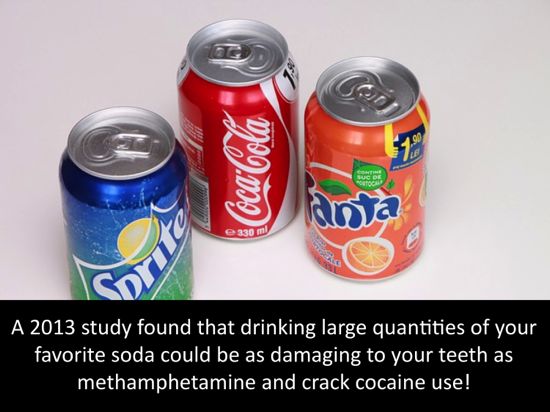
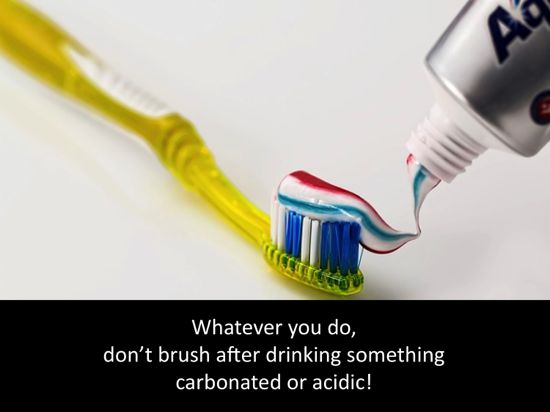
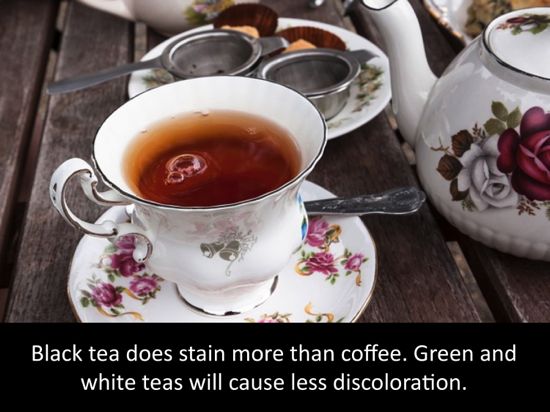
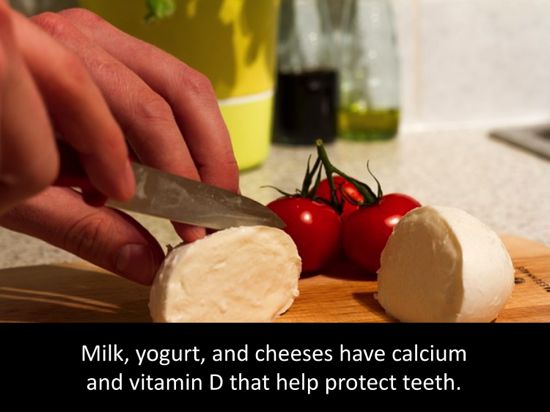
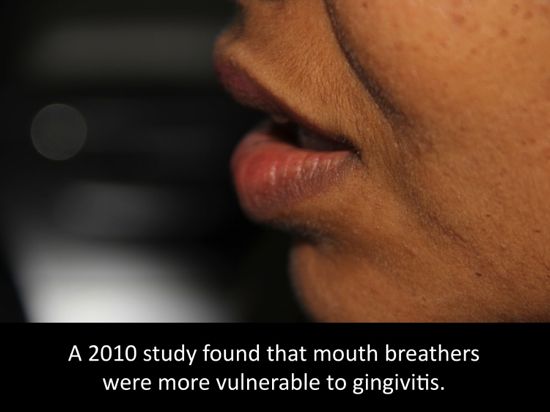
I was surprised to find that almost all of my habits are bad. (I thought I was in good shape because I don’t drink soda!) Thanks for the wake-up call. I drink black and herbal tea brewed together, thinking it’s healthy! I snack on oranges, jalapeno peppers, and pickles- all reasonably healthy as food goes, but all acidic. And I chew on ice. And breathe through my mouth during allergy season- which is almost every season for me. Oh well, live and learn! I’ll have to look up butterbur.
Oh dear! Sorry, Chere! Yes, I was surprised too—but now I know where my sensitivity is coming from! :O)
Well, I don’t drink sugary sodas, and I drink more water than tea and coffee.
But I’m pretty much guilty for all the other reasons (snack in front of the computer screens—I have two screens) and now that I’m paying attention, I am breathing more through my mouth, but I haven’t had any serious problems with my teeth since I retired from teaching in 2005—just one fillings and one crown and they were both replacements due to decay under the filling and crown.
Teaching on the other hand did a lot of damage to my teeth. I taught for thirty years and I think the high stress that comes with being a public school teacher in the U.S. is harder on teeth than staring at a computer screen. While I was teaching, I had a lot of annual work done on my teeth and have too many crowns to show for it, and grinding my teeth in my sleep caused a few to crack and break.
Of the ten most stressful jobs in America, teachers are listed as #4 behind police (3rd), the military (2nd) and parenting as #1.
Most teachers deal with lots of job stress. They have to be well prepared every day, and they get very little down time — none, really, while students are present. Many people think that teachers have good working schedules, but teachers take a lot more of their work home with them than other professionals (I can testify to this. I often worked 60 to 100 hours a week but only 25 of those hours was with students). There are always lessons to plan, papers to grade and records to keep. In addition, the pay isn’t much, compared to professions with similar educational requirements.
Increasingly, public school teachers face additional problems of lack of respect from students, and even from students’ parents and the general public. Because they’re paid with tax dollars, public school teachers are always under scrutiny (and this doesn’t mention the Common Core Agenda that is aimed at destroying the public schools by attacking teachers).
In fact, few professionals in the United States are judged as closely as teachers are. Emphasis on test scores finds teachers held accountable if their students don’t improve each year — even if the students may be hampered by factors outside the classroom.
And here’s the link between high levels of stress and tooth decay.
Stress and oral health is an entirely new ballgame for most people. Unfortunately, our mouths have just as much of a chance of being affected by stressful situations as our bodies and minds do. Researchers have found a significant link between stress and oral health, helping us better understand what part anxiety and depression take in the development of dental problems.
http://www.1800dentist.com/how-stress-can-affect-your-oral-health/
I think I’m going to drink more water and pay attention to breathing more through my nose. Thanks.
Good point, Lloyd—stress definitely can contribute to poor health, including poor oral health. In addition to the potential teeth grinding and chewing it encourages, there’s also the increased potential for inflammation, which can lead to a host of other problems. I know you’re passionate about teaching—I got my Bachelor’s in education but then turned to writing instead because of all the problems I saw. (I still teach privately.) Thanks for stopping by and sharing your thoughts!